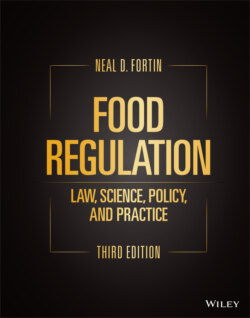Читать книгу Food Regulation - Neal D. Fortin - Страница 40
Equal Protection
ОглавлениеThe U.S. Supreme Court has also interpreted due process to mean that no person shall be denied equal protection of the laws. This guarantee is provided for explicitly in the Fourteenth Amendment, applicable to the states, and implicitly in the Fifth Amendment Due Process clause, applicable to the federal government. Equal protection of the law refers to an even‐handed application of law. In its most basic sense this means that government and the legal system cannot arbitrarily discriminate. Equal protection may be violated in two ways: directly by the words of the law or by the application of the law.
Equality before the law applies not only to the specifics of a law but also to how agencies implement the law. For example, under a local ordinance, which prohibited the construction of wooden laundries without a license, almost all Chinese applicants were denied licenses, while non‐Chinese applicants routinely received them. Although the ordinance was a valid safety measure on its face, the implementation violated the equal protection clause of the Fourteenth Amendment.46
Nonetheless, equal protection does not require identical treatment. Government may classify people into groups and treat these groups differently. For example, regarding workers in food establishments, the law places special restrictions on persons suffering from certain communicable diseases. This distinction does not violate equal protection because the government may differentiate between individuals and groups if it has good reason to do so. The critical question is what is an acceptable reason for applying the law differently to persons in similar situations.
